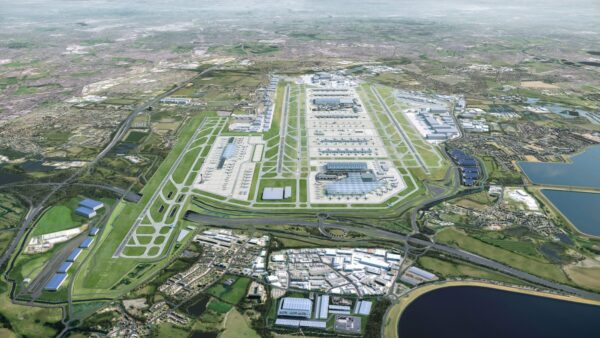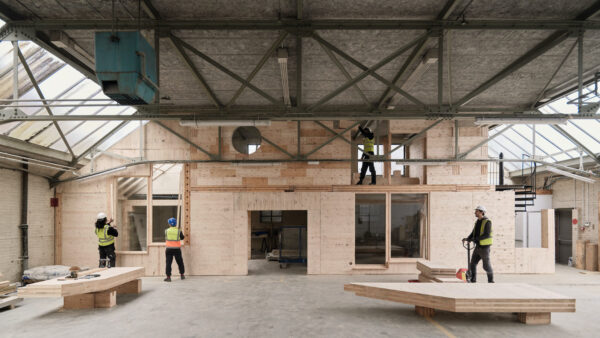
David Allen
As Wates Group enjoys a busy 2019 in its construction division off the back of a series of contract wins, chief executive David Allen tells Neil Gerrard how the company is training a new generation of leaders.
Wates Group chief executive David Allen wants leaders. He sees strong stewardship at the top of the family-owned construction, development and property services firm as key to ensuring high standards of safety and quality.
That’s all the more important when you consider that after a 9% drop in construction turnover in 2018 to £849m following the EU referendum, Wates expects construction turnover in 2019 to rebound, with 10% growth. This follows a series of contract wins, including a £161.5m deal with Quintain to build 633 homes at Wembley Park and a place on the framework for the £650m renovation of Parliament’s Northern Estate.
“There was a pause after the referendum but last year our construction business won far more than its share, really,” says Allen. “We won the second highest value of work in the sector and that is reflected in our expectations around growth in 2019 and beyond. We are in a very privileged position as a family-owned business. We don’t have the listed company pressure to push for continuous turnover growth come what may. We are able to take a longer-term view and make sure we only stick to what we are good at and we are able to provide a good service to the customers we do work for.”
Preparing to lead
To that end, the business has embarked on a series of staff development programmes, with a particular emphasis on future leaders. Currently, it has 177 people working in the business either on trainee programme or apprenticeships, to provide the fundamental skills they need to work in the industry. But Wates also has a series of development programmes to help them progress through the organisation, Allen explains.
That includes a junior board process that gives emerging leaders exposure to the way the executive committee and group board work, with a view to taking on the most senior roles such as business unit leader and above. There are also other programmes for different levels and different competencies, whether that is general leadership or functional skills.
“One of the areas that I think we have done a really strong job on is how we focus on leadership as the method through which we improve the safety and quality of what we do. So almost all of our senior managers have now been through a programme called ‘Leading the Change’, which is about how we focus on achieving the zero-harm environment that we are looking to achieve,” Allen adds.
David Allen CV
- A chartered accountant, Allen began his career with Arthur Andersen’s tax practice.
- Worked as a manager in HSBC’s Investment Bank from 1997 until 2000, before moving to a senior management role at Accenture.
- Became finance director of Laing O’Rourke Construction in 2004.
- Appointed finance director of Laing O’Rourke European Construction in 2008.
- Appointed finance director of Crossrail from March 2009.
- Joined Wates initially as chief financial officer in 2016. Promoted to chief executive in April 2018.
Sustaining quality
Wates’ focus on quality is perhaps unsurprising given that Wates Group chairman James Wates sits on the CIOB’s Past Presidents’ Construction Quality Commission. The company is one of eight organisations to have joined the Ministry for Housing, Communities and Local Government’s (MHCLG) early adopters programme, established in July last year following Dame Judith Hackitt’s independent review into Building Regulations and fire safety, with the aim of developing and showcasing good practice, raising standards within construction and helping to shape policy interventions.
Meanwhile, James Wates is also working on a corporate governance code called the Wates Principles, developed in coalition with the Financial Reporting Council to encourage companies to adopt better behaviours and secure trust and confidence in business.
“I think we are quite a well-disciplined organisation and that discipline has been a feature of our culture,” says Allen.
“Clearly quality is critical in terms of safety on site and avoiding rework and in making sure that we deliver what our customers think that they are buying. We have a process called ‘Delivering the Promise’, through which we check in with our customers on a structured basis through each of our projects to check that we are meeting expectations and that they are satisfied with the quality of everything we do,” he adds.
He also sees the increased use of offsite construction as an important component in the quality agenda.
“There will be advantages in increasing the proportion of work that is delivered through offsite methods. We have quite a well-known way of delivering schools through our Adapt process and we have made a big effort there to eliminate wet trades, which gives us some quite significant programme advantages and leaves us less exposed to some skills gaps,” he says.
“We use structural insulated wall panels, precast concrete slabs, and some of the horizontal distribution of services is increasingly handled through modules made in our Prism factory within the SES Engineering Services business, which greatly simplifies the amount of M&E work that needs to be done on site.”
Broadening the church
Allen recognises that more work needs to be done when it comes to diversity, both in the industry as a whole and in the company he runs. “We need to make our organisation more attractive to a broader range of people so we are very thoughtful about how we target schools and colleges to make sure we have the best people coming into the organisation,” he says.
David Allen on…
…digital skills
“We have a number of jobs through the Scape framework that are BIM Level 2 and we are working with schools customers to deliver a Level 3 or digital twin school in the coming years.”
…modern slavery
“We like to have durable, lasting relationships with the suppliers we use. Our legal team and procurement team carry out a whole host of checks to ensure that we are as clean as we can possibly be on this.”
Wates is working hard to address construction’s well-publicised gender imbalance and Allen points to an increase – albeit a “fairly modest” one so far – in the number of female Wates employees. During 2018, the proportion of women at the firm rose to just under 19%, including some women who entered leadership positions. Meanwhile, the proportion of women coming into the trainee intake was higher, at 31%, and the proportion of women on the company’s graduate programme rose to 24%.
“These are small steps but we are determined to keep making them and to end up in the end with a workforce that is more properly balanced.”
Social value
Meanwhile, Allen is also determined to see Wates increase the level of social value that it creates in the communities it works in. In its latest financial results, the company revealed that it has doubled spending on social enterprises from £2.7m in 2017, to £5.5m in 2018. The business has a target of spending £20m with social enterprises by 2020.
“We have a pretty fundamental belief that if we run our business properly, there can be some very significant benefits for the communities we work in and society at large,” he says.
Projects Wates has funded include Streetwise, an organisation that delivers community clean-ups, alongside local residents and community groups, and teaches people how to care for the environment, and Birmingham-based Argonaut, which places deaf and disabled people in maintenance, cleaning and gardening work.
All in all, Allen feels hopeful about Wates’ future and the preparations it is making to meet it. He concludes: “I think the work we do is exciting and it matters. Having our people feel confident, energetic and optimistic about that is very important in terms of the future of Wates. We should feel determined in our effort to keep on making a difference.”
Comments
Comments are closed.











If the new Wates CEO is seriously interested in diversity, and the ultimate challenge of attracting and retaining more women to work at the ‘blue collar’ end of the construction continuum – in the skilled trades (where women still represent only 2% of the trades workforce) perhaps David Allen would like to fund Women & Manual Trades to establish a partnership project?
If he is interested he should contact Andrea Kelmanson at the above email address.